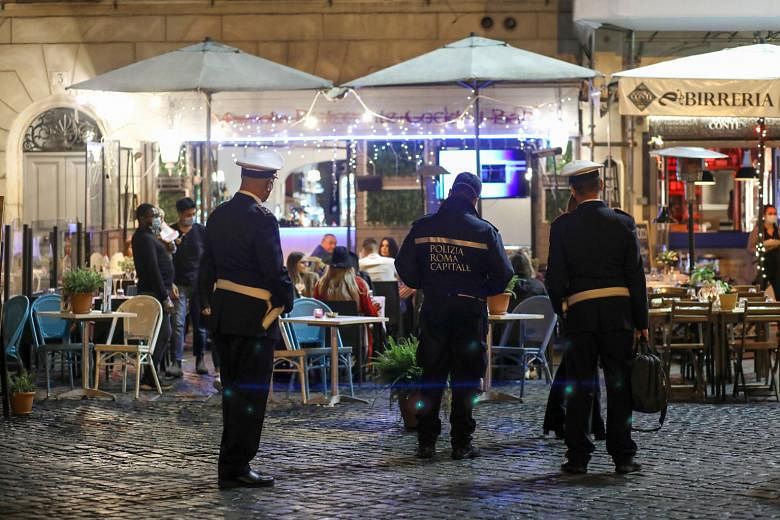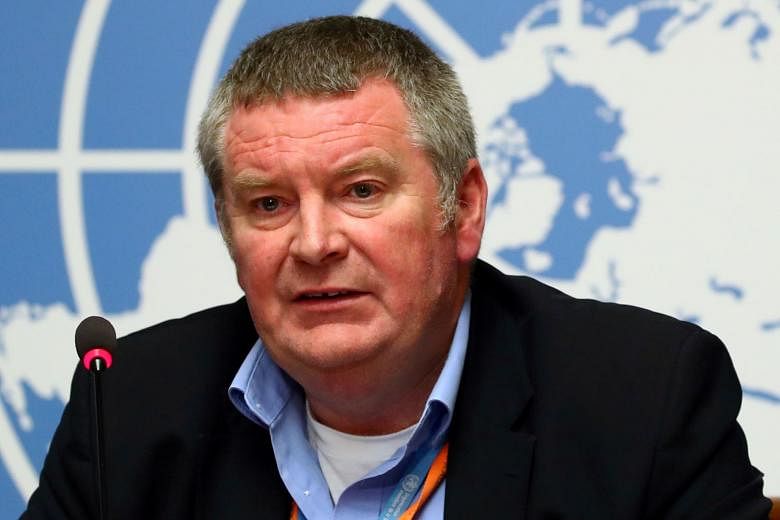PARIS • Germany warned of the country's "very serious situation" and France cautioned that "the coming weeks will be hard", as the coronavirus continues to spread unrestrained across Europe.
Covid-19 cases in the region have more than doubled in 10 days, crossing 200,000 daily infections for the first time on Thursday, with countries like Italy, Austria, Croatia, Slovenia and Bosnia reporting their highest single-day increases.
Europe had recorded 100,000 daily cases for the first time only on Oct 12. It has so far reported about 7.8 million Covid-19 cases and 247,000 deaths in total.
As a region, Europe is seeing more daily cases than India, Brazil and the United States combined.
It now accounts for nearly 19 per cent of global cases and about 22 per cent of global deaths.
"The health situation of our country continues to deteriorate," France's Prime Minister Jean Castex said on Thursday, as he widened a coronavirus curfew to more than two thirds of its population. "The coming weeks will be hard and our hospitals will be sorely tested."
France is reporting Europe's highest seven-day average of new cases, with 25,480 infections a day. It recorded an all-time high of 41,622 new confirmed cases on Thursday.
Paris and eight other French cities came under a 9pm to 6am curfew last weekend. The new rules were extended to 38 more departments and French Polynesia for six weeks from midnight yesterday.
The number of confirmed cases per 100,000 inhabitants has risen by 40 per cent in a week to 251 per 100,000, Mr Castex said.
The Prime Minister warned that if France does "not succeed collectively in halting the epidemic, we will be faced with a dramatic situation and will have to envisage much tougher measures".
He refused to say if this meant that the whole country could be put under a second lockdown in the run-up to the Christmas holidays.
The curfew in Paris, Lyon, Marseille and other big cities has forced bars, restaurants and theatres that had already suffered huge losses during an earlier two-month lockdown to close early, leaving many fighting for survival.
French Culture Minister Roselyne Bachelot on Thursday announced an €85 million (S$137 million) aid package for theatres, concert halls and other live entertainment venues, along with a further €30 million for cinemas.
"Everyone needs culture, maybe even more so during this crisis, which has affected our ability to gather together," she said.
In Germany - which reported more than 10,000 daily cases for the first time on Thursday - the authorities extended travel warnings for Switzerland, Ireland, Poland, and most of the Austrian and Italian regions, including Rome.
While Germany's infection rates are lower than in much of Europe, they have also been accelerating.
"The situation has become very serious overall," said Professor Lothar Wieler, head of the Robert Koch Institute for infectious diseases, adding that the country must prepare for an uncontrolled spread of the virus.
"We still have a chance to slow the spread of the pandemic", but people must stick to the rules, Prof Wieler said.
Germany's new travel warnings cover places such as popular ski regions in Austria, Italy and Switzerland. Britain, except the Channel Islands, the Isle of Man and the overseas territories, is also seen as a high-risk area.
Under the warnings, which take effect from today, travellers returning to Germany must quarantine for 10 days. Quarantine can be lifted early, if a test taken after five days comes back negative.
Germany's move could significantly impact the Alpine countries' ski season. Austria, which reported a record 2,435 new daily infections on Thursday, is a popular destination for Germans.
Over in the Netherlands, the health authorities also reported a new daily record of more than 9,000 infections on Thursday.
A World Health Organisation (WHO) expert said this week that Europe and North America should follow the example of Asian states by persevering with antivirus measures and quarantining anyone who comes into contact with those infected.
"The countries in Asia, South Asia, the Western Pacific that have been successful... have really continued to follow through on those key activities," WHO executive director Mike Ryan said.
REUTERS, AGENCE FRANCE-PRESSE
















